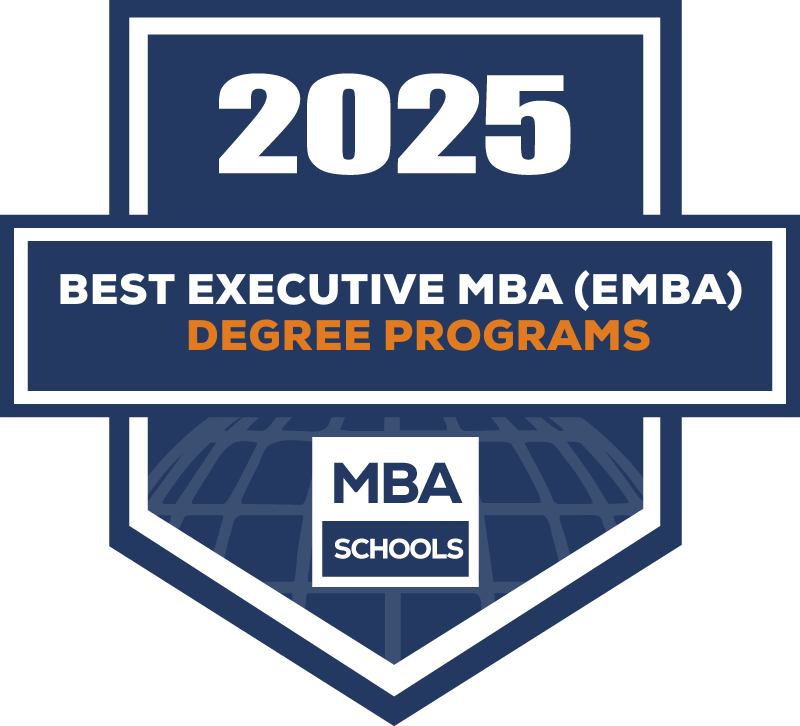Table of Contents
Best Executive MBA (EMBA) Degree Programs
An Executive MBA (EMBA) is a powerful tool for career advancement. It allows executives to refine their leadership skills while maintaining their professional responsibilities. This specialized degree is designed for professionals ready to advance their careers without stepping away from their current roles. With a curriculum focused on strategic decision-making, organizational leadership, and global business perspectives, an EMBA equips executives with the knowledge and skills to navigate complex business environments.
An Executive MBA (EMBA) is a powerful tool for career advancement. It allows executives to refine their leadership skills while maintaining their professional responsibilities. According to the Executive MBA Council, EMBA graduates see an average compensation increase of 23.9% upon completion of their program. Additionally, 42% of students receive promotions during their studies, proving the immediate impact of an EMBA on career growth.

Best EMBA Programs 2025
Finding the best Executive MBA (EMBA) program requires careful consideration of factors such as academic reputation, program structure, networking opportunities, and return on investment. The top EMBA programs cater to seasoned professionals, equipping them with the leadership and strategic skills necessary to ascend to executive roles in a rapidly evolving business landscape. These programs emphasize real-world applications, high-level networking, and global business insights to ensure participants maximize their learning while continuing to advance in their careers.
Designed for mid-to-senior-level professionals, EMBA programs typically feature rigorous coursework that integrates leadership development, financial acumen, strategic decision-making, and organizational management. Many programs offer immersive international experiences, executive coaching, and collaboration opportunities with top industry leaders and faculty. Additionally, cohort-based learning structures foster invaluable peer connections, enabling participants to expand their professional networks across diverse industries and geographies.
Our rankings of the best EMBA programs for 2025 are based on a comprehensive analysis of curriculum strength, faculty expertise, career outcomes, and program flexibility for working professionals.

Learn more about our methodology
What Is an Executive MBA (EMBA) Program?
An Executive MBA (EMBA) is a graduate-level business degree explicitly designed for experienced professionals and executives who want to enhance their leadership skills while maintaining their full-time jobs. Unlike a traditional MBA, which often targets early-career professionals, an EMBA is structured to fit the busy schedules of senior managers, offering weekend or modular classes.
While the EMBA and a one-year MBA accelerate career growth, the EMBA focuses more on executive leadership and strategic decision-making. It often incorporates global business experiences and real-world applications.
Can I Get an Executive MBA Online?
With the increasing demand for flexibility in higher education, many top universities offer Executive MBA (EMBA) programs in online and hybrid formats. These programs are specifically designed for busy professionals who must balance career, family, and education without compromising quality. Online EMBAs provide the same rigorous curriculum and networking opportunities as traditional programs while offering enhanced accessibility for executives worldwide.
Hybrid models combine the best of both worlds, allowing students to engage in face-to-face networking and hands-on learning experiences while benefiting from online the convenience of online coursework in the correct format depending on personal learning preferences, career commitments, and desired in-person interaction. Below are the primary delivery options for EMBA programs.
- Online EMBA: Fully online programs provide maximum flexibility, allowing students to complete coursework from anywhere.
- Hybrid EMBA: A blend of online and in-person learning, ideal for executives who value networking but need flexibility.
- Traditional EMBA: In-person weekend or modular programs for executives who prefer classroom interaction and immersive experiences.
Online and hybrid EMBAs offer the same rigorous curriculum as on-campus programs, ensuring students gain valuable insights while maintaining career momentum.
Traditional MBA vs. EMBA
Understanding the differences between a Traditional MBA and an Executive MBA (EMBA) is crucial for choosing the right program for your career path. Traditional MBAs are typically designed for early-career professionals seeking a foundational business education. At the same time, EMBAs cater to seasoned executives looking to refine leadership and strategic decision-making skills without stepping away from their current roles. The table below highlights key distinctions to help you compare both options.
| Feature | Traditional MBA | Executive MBA (EMBA) |
|---|---|---|
| Target Audience | Early-career professionals | Mid-career & senior executives |
| Work Experience | 2-5 years | 8-15+ years |
| Program Length | 1-2 years | 18-24 months |
| Format | Full-time or part-time | Weekend/Hybrid/Online |
| Tuition Cost | Varies, often lower | Higher due to executive-level faculty & networking benefits |
| Focus | Business fundamentals | Leadership, strategy, and executive decision-making |
| Networking | Peer & faculty connections | High-level industry & executive networking |
EMBA Admissions Requirements
Gaining admission into an Executive MBA program is competitive. These programs are designed for high-achieving professionals with significant leadership experience. Admissions committees seek candidates who meet academic standards and bring valuable real-world insights to the classroom. Prospective students must demonstrate their ability to balance rigorous coursework with their professional responsibilities. Below are the typical admissions requirements for an EMBA program.
- Work Experience: Minimum 8-10 years, with managerial or executive roles preferred.
- Undergraduate Degree: From an accredited institution.
- GMAT/GRE (Optional): Many programs waive this requirement for experienced professionals.
- Letters of Recommendation: From supervisors or industry leaders.
- Personal Statement or Essay: Outlining leadership experience, career goals, and motivation for an EMBA.
- Interviews: Some programs require interviews to assess leadership potential.
EMBA Curriculum and Courses
The Executive MBA curriculum is meticulously crafted to develop executive-level leadership, strategic thinking, and decision-making skills. Unlike traditional MBA programs, EMBA coursework is specifically designed to address the challenges experienced professionals face. Students can expect a mix of core business courses, leadership development modules, and global business immersion experiences. Many programs emphasize hands-on learning through case studies, executive coaching, and networking opportunities with industry leaders. Below are some standard courses included in an EMBA program.
- Strategic Leadership & Decision-Making
- Global Business & International Strategy
- Financial Management for Executives
- Corporate Governance & Ethics
- Operations & Supply Chain Management
- Marketing Strategy & Consumer Insights
- Entrepreneurship & Innovation Management
Graduation requirements typically include a capstone project, leadership development initiatives, and global immersion experiences to enhance real-world application of skills.
Take the Next Step in Your Career
An Executive MBA is more than just a degree—it’s a strategic investment in your future. With the right EMBA program, you’ll gain the leadership skills, executive-level insights, and influential network needed to accelerate your career and make a lasting impact in your industry. Whether you choose an online, hybrid, or traditional format, the opportunities with an EMBA are limitless.
Don’t wait to advance your career. Explore top EMBA programs today and take the next step toward achieving your professional goals.
Sources
- Executive MBA Council. (2025). EMBA Research & Industry Trends. Retrieved from https://www.embac.org/research-in-context.html
- University of Pennsylvania, Wharton School. (2025). Executive MBA Class Profile & Admissions. Retrieved from https://executivemba.wharton.upenn.edu/class-profile/
- University of Pennsylvania, Wharton School. (2025). Executive MBA Curriculum Overview. Retrieved from https://executivemba.wharton.upenn.edu/mba-or-emba/